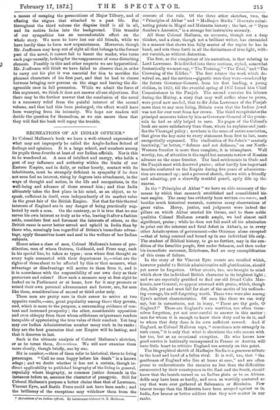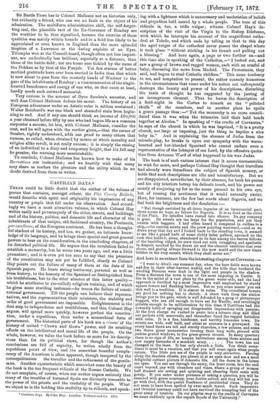RECREATIONS OF AN INDIAN OFFICER.*
Ii Colonel Malleson's book we have a well-uttered expression of what may not improperly be called the Anglo-Indian School of
feelings and opinions. It is a large school, and numbers among its pupils three-fourths at least of our Indian officials. Nor is this to be wondered at. A man of intellect and energy, who holds a post of any influence and authority within the limits of our Eastern Empire, and in daily, or rather hourly, contact with its inhabitants, must be strangely deficient in sympathy if he does not soon feel an interest, rising by degrees into attachment, in the ways of thought and action, in the life and occupations, in the well-being and advance of those around him ; and thus India ultimately takes the first place in his mind, as an object, so to speak, sufficient in itself, even independently of its market value in the great fair of the British Empire. Not that for this the real interests of England are in any danger of being practically neg- lected by such a man. On the contrary, as it is true that no one serves his own interest so truly as he who, leaving it after a fashion aside, considers first and foremost the interests of others, so the British cause is never better served and upheld in India than by those who, seemingly less regardful of Britain's immediate advan- tage, apply themselves heart and soul to the welfare of her Indian subjects.
Hence arises a class of men, Colonel Malleson's heroes of pre- dilection, men of whom Outram, Goldsmid, and Frere may, each in his special line, be taken as types ; men whose first thought on every topic connected with their department is,—what are the rights of those about to be affected by this or that measure, what advantage or disadvantage will accrue to them from it, and is it in accordance with the responsibility of our own duty as their protectors and rulers? How such a measure may at first eight be looked on in Parliament or at home, how far it may promote or retard their own personal advancement and favour, are, for men like these, considerations of second or third order only.
These men are pretty sure in their career to arrive at two opposite results,—one, great popularity among those they govern, and, which is more to the purpose, a surrounding evidence of con- tent and increased prosperity ; the other, considerable opposition and even obloquy from those whom selfishness orignorance renders incapable of appreciating the true value of their conduct. Yet long may our Indian Administration number many such in its ranks ; they are the best guarantee that our Empire will be lasting, and that it deserves to last.
Such is the ultimate analysis of Colonel Malleson's sketches, or as he terms them, Recreations. We will now examine them more closely, though briefly, one by one.
Six in number,—three of them refer to historical, three to living personages. " Call no man happy before his death" is a known adage ; and we doubt whether it has not a certain, though in- direct applicability to published biography of the living in general, especially where biography, as common justice demands in the instances before us, assumes the character of panegyric. Still for Colonel Malleson's purpose a better choice than that of Lawrence, Vincent Eyre, and Bartle Frere could not have been made ; and the brilliancy of the exceptions may withdraw them from the Recreations of an Indian Official, By Lieutenant-Colonel U. B. Malleson.
' censure of the rule. Of the three other sketches, two, the "Principles of Akbar " and " Madhajee Sindia " illustrate culmi- nating points in Mogul and Mahratta history ; the last, or " Dyce- Sombre's Ancestor," is a strange but instructive anomaly.
All these Colonel Malleson, an accurate, though not a deep. thinker, and a clear, though not a brilliant writer, has chronicled in a manner that shows him fully master of the topics he has in hand, and sets them forth in all the distinctness of true light, with- out varnish, as without distortion.
The first, as the completest of his narratives, is that relating to Lord Lawrence. It is divided into three sections, styled, somewhat fantastically we must say, " The Training," "The Trial," and "The Crowning of the Edifice." The first relates the work which de- volved on, and the services—gigantic ones they were—rendered by the future Governor-General, from his first landing, a young, civilian, in 18:29, till the eventful spring of 1857 found him Chief Commissioner in the Punjab. The second contains his labours- during the Mutiny, a story that may well suffice alone to prove, were proof now needed, that to Sir John Lawrence of the Punjab- more than to any man living, Britain owes that the Indian jewel was not for ever rent from her crown. The third recapitulates the- principal measures taken by him as Governor-General of the penin- sula he had so ably helped to save. No pages of the Colonel's- book are more satisfactory than these, where he explains and justi- fies the Viceregal policy ; nowhere is the sense of entire conviction, that gives the key-note to every statement from first to last, more- energetically expressed. The vindication of Sir John's " masterly inactivity," or better, " defence and not defiance," on our North- Western frontier is more than complete, it is triumphant. Welt worthy, too, of attention is the rapid but accurate review of Russian• advance on the same frontier. The land-settlements in Oude and the Punjab meet with deserved praise ; other hardly less important. benefits conferred on the Empire during five years of administra- tion are summed up ; and a personal sketch, drawn with a friendly and admiring, yet a shrewdly truthful pencil, aptly fills up the canvas.
In the " Principles of Akbar " we have an able summary of the means by which that monarch' established and consolidated hie. vast empire. The essay has evidently been written con amore, ands besides much historical research, contains many observations of great value. Mercy, justice, and judgment were indeed the- pillars on which Akbar erected his throne, and to these noble- qualities Colonel Malleson awards ample, we had almost said significant, praise ; while he does not fail amid all his admiration, to point out the inherent and fatal defect in Akbar's, as in every- other Asiatic system of government—the Ottoman alone excepted) —that of being centred and bound up in one individual life only. The student of Biblical history, to go no further, may in the con- dition of the Israelitic people, first under Solomon, and then under- his immediate successor, Rehoboam, find an easy exemplification, of this cause of failure.
In the story of Sir Vincent Eyre events are recalled which,, however painful to British administrative self-glorification, should yet never be forgotten. Other events, too, are brought to mind which show the individual British character in its brightest light and we are especially gratified to find our old friend Colin Mac- kenzie, now General, re-appear crowned with praise, which, though• dae, falls yet and must fall far short of the merits of his unflinch- ing courage, his self-forgetting worth. These two were also among: Eyre's noblest characteristics. Of men like these we can truly say, but in earnestness, not in irony, " These are thy gods, 4::0 England !" These are England's own worthies, too often them- selves forgotten, yet not over-careful to answer in this matter men for whom it is enough to know their duty and to do it, and to whom that duty done is its own sufficient reward. And it England, as Colonel Malleson says, " sometimes acts strangely in. such cases," it is only that what is elsewhere the rule occurs with her too, but as an occasional exception. He who knows how- good service is habitually recompensed in France or Austria wills have little heart to criticize England too severely on this point.
The biographical sketch of Madhajee Sindia is a generous tribute- to the head and hand of a fallen rival. It is well, too, that "the gentlemen of England who live at home at ease," and are often, prone to underestimate the enemies no less than the difficulties
surmounted by their countrymen in the East and the South, should know that the laurels earned on an Indian plain or in an African, defile may have been as hardly, and even as worthily contested as. any that were ever gathered at Salamanca or Blenheim. Few braver troops than the Mahratta have been arrayed against ns in India, few braver or better soldiers than they now muster in our ranks. Sir Bartle Frere has in Colonel Malleson not an historian only, but evidently a friend, who can see no fault in the object of his admiration. The multiform administrative skill, the self-forget- ting zeal, the plausible tact of the Ex-Governor of Bombay are the worthier to be thus signalized, because the exercise of these qualities was mainly within bounds and in a field less likely to be appreciated or even known in England than the more splendid trophies of a Lawrence or the daring exploits of an Eyre. Triumphs won at the Council-board, though often not less import- ant, are undoubtedly less brilliant, especially at a distance, than those of the battle-field ; nor are home ears tickled by the name of the Dekkan as by that of the Punjab. Yet few statues of better merited gratitude have ever been erected in India than that which is now about to pass from the masterly hands of Woolner to the gaze of the inhabitants of Bombay ; a commemoration of the single- heartel beneficence and energy of one who, on that coast at least, hardly needs such outward memorial.
Very curious is the account of Dyce Sombre's ancestor, and well does Colonel Malleson deduce his moral. The history of. an European adventurer under an Asiatic ruler is seldom unstained ; Walter Reinhard's was one black and shameful stain from begin- ning to end. And if any one should think an income of £60,000 a year obtained before fifty by one who had begun life as a common carpenter a success, let him, with Colonel Malleson, consider the cost, and he will agree with the verdict given,—that the career of Sombre, rightly understood, adds one proof to many others that success, so called, when obtained by means at which morality and religion alike revolt, is not really success ; it is simply the raising of an individual to a dizzy and temporary height, that his fall may be greater, the warning more unmistakable.
To conclude, Colonel Malleson has known how to make of his Recreations our instruction ; and we heartily wish that many may share as readers the pleasure and the utility which be no doubt derived from them as writer.



































 Previous page
Previous page